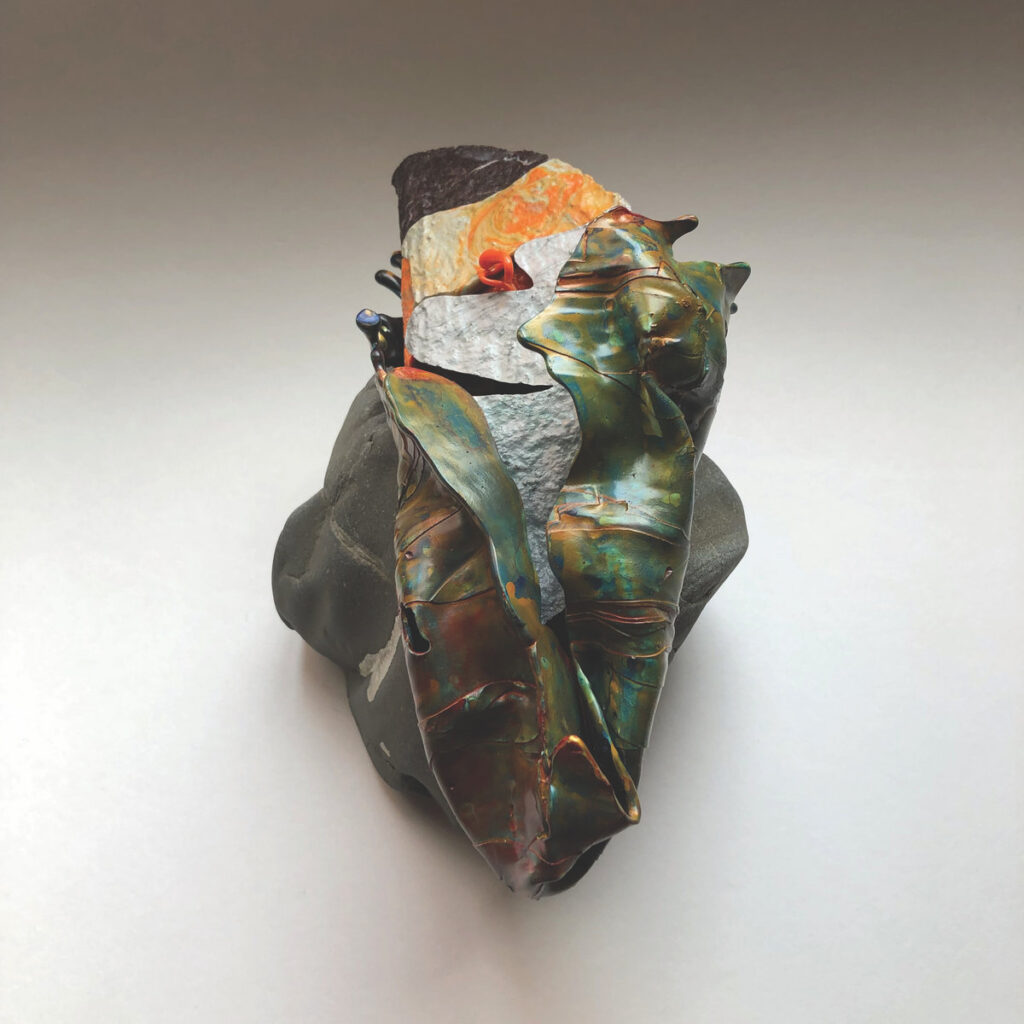
Artists Rrose and Polygonia have just released their collaborative album Dermatology on September 20 via Eaux, the label founded by California-born, UK-based artist Rrose.
United by a shared musical vision, the two artists began this project in 2022 after Rrose reached out to Polygonia with the idea of collaborating. Now, two years later and somewhat unexpectedly, we are treated to the result of this union: Dermatology, a six-track, 40-minute album that lives up to its name by offering a blend of danceable, experimental organic techno.
The album specifically explores their shared interest in “sonic shapes that resemble natural forms and conjure tactile feelings, in this case related to themes of skin-like surfaces and circulatory systems experienced simultaneously on a micro and macro level.”
Rrose is the alias of London-based, California-born, multidisciplinary artist Seth Horvitz. His name is a reference to Rrose Sélavy, the fictional persona created by Marcel Duchamp. Much like the French artist did a century ago, Rrose has developed a true alter ego to bring his artistic vision to life. Active since 2011, Rrose explores the intersection of hypnotic techno, experimental composition, and psychoacoustic phenomena through a musical production that combines tracks worthy of unbridled underground dancefloors with avant-garde and experimental musical creations. Founding Eaux following the end of the Sandwell District label, he issued several releases: EPs like “Vanishing Pools,” “The Ends of Weather” and “Arc Unknown” as well as LPs “Hymn to Moisture” and “Please Touch.”.
As for Polygonia – the multidisciplinary music and art project conceived by Lindsey Wang – interestingly enough, it was after attending a set by her now co-producer Rrose at a festival in 2018 that she became interested in techno. Before that, Lindsey Wang, originally from Munich, Germany, had primarily focused on exploring the realms of various acoustic instruments. This skill, combined with her study of various other art forms, inspired the artist to translate her understanding of rhythm, composition and experimentation into the language of digital music. Polygonia’s musical identity is guided by a mystical, deep and organic quality with a sound palette ranging from energetic, groovy Deep Techno, Downtempo, Grey Area to textural and/or harmonic Ambient… and those are only a few of the genres she draws from to create her signature one-of-a-kind music.
The album opens with “Ellipses,” a calm and mysterious track (something that won’t necessarily apply to the following ones) featuring an echo of sounds in small, dry strokes that seem to sail along the musical scale, reminiscent of sonar in the depths of the ocean. This sense of vastness becomes more rhythmic around the 1:00 mark with the introduction of a slow, muffled kick signaling the transition from an ambient introduction to a more danceable beat. Eventually, the myriad of ethereal sounds that initially seem disjointed coalesce into a harmonious blend. Overall, “Ellipses” is an evolving, sober track, rich in distinct sounds that combine seamlessly to create a deep, immersive tunnel. It gives a sense of something wet; perhaps instead of an ocean, one could imagine a microscopic probe navigating the vastness of bodily fluids, in keeping with the album’s “Dermatology” theme.
The next track, “Stretcher,” is, in my opinion, a certified banger. Highly danceable yet still airy and atmospheric, it’s arguably the catchiest track on the release. It opens with rough kicks, establishing a vibrant rhythm from the outset, soon joined by melodic touches that evolve throughout. “Stretcher” plays heavily on the contrast between the force of the kicks and the lightness of the sonic vapor introduced throughout. The interplay between these two elements gives the track a sense of constant metamorphosis, cycling through different forms.
The third track, “Inhaler” (my personal favorite) is a darker, more somber piece. It starts off like a slow march, with a beautiful bassline holding down the low frequencies, repeating two notes tirelessly. The pace picks up around the one-minute mark, creating a minimalist and ethereal atmosphere, reminiscent of black latex on a dancer’s skin. Midway through, the bass becomes saturated, adding an acidic touch. By the fourth minute, the track blends into a wave that borders on dissonance, engulfing the listener completely before gently fading out.
“Haima,” the fourth track, begins with a very danceable beat while maintaining a calm, minimalist rhythm. It incorporates several intriguing effects from the start, including a slightly surprising, arrhythmic sound that follows the minimal pace and adds an experimental touch. Around the three-minute mark, a well-saturated electric wave introduces a drop that compels you to move to the rhythm. From there, the energy builds, bursting and intensifying until the end, where it concludes with monotonous saturated bass notes. This is another standout track, perhaps the second best on the album.
The penultimate track, “Diastole,” carries a strong electric feel, so much so that by the end, its energy seems to take on an organic form. It begins quite calmly with a smooth, rounded rhythm, accompanied by echoing synths that intensify the track’s immersive quality. The various effects layered onto the rhythm give “Diastole” the feeling of a static electricity field you want to dive into, with the synths adding a sizzling sensation that sends shivers down your spine. From the fifth minute, the track escalates, and the electric field begins its organic transformation, driven by a new, elongated saturated bass – this time not in waves like the previous track, but rather in a volatile play between high and low frequencies over time.
The album closes with “Vena Cava,” a shorter and much more experimental track compared to the others. It’s definitely less danceable, but no less compelling and interesting. The rhythm, alternating between muffled and saturated, sets the tone. Around the two-minute mark, a unique effect, like an aerial suction sound, pulls the listener forward, leading into a long outro filled with small, high-pitched organic touches, first paired with dissonant synths. These sounds eventually transform into a kind of cricket song on a dark summer night.
In “Dermatology,” Rrose and Polygonia have created a work that feels both tactile and ethereal, blending the experimental with the more accessible in progressive tracks that invite deep listening or to simply dance frantically in the darkest hours of the night. Each one of them offers a unique texture, from the pulsating rhythm of “Stretcher” to the dark, immersive atmosphere of “Inhaler.”
Ultimately, “Dermatology” stands out as a captivating piece of organic techno that showcases the duo’s ability to merge their art into something both meditative and danceable.
-Hugo Bingler
Check out Dirty Epic music recommendations here.
Listen to our podcasts here.
Find out more about our Events here.
Listen to our review picks here.

